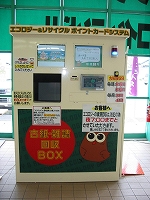Reduce / Reuse / Recycle
August 17, 2008
Paper Recycler Adds Used Cooking Oil to Recycling and Rewards Point System
Keywords: NGO / Citizen Non-manufacturing industry Reduce / Reuse / Recycle University / Research institute

Copyright Mie Waste Paper Center
The automated machine allows residents to bring their used cooking oil and waste paper in at any time of day. The waste paper is recycled into new paper, and the used cooking oil is processed into biofuel.
The idea of recycling cooking oil in the Utsube district came out of a series of seminars to study the future of the environment, organized in 2007 as a lifelong learning activity for citizens. The participants compiled their ideas into a list of top ten proposals for protecting the environment, and one of them was the idea of recycling used cooking oil. The residents then asked the company in December 2007 if it would add used cooking oil to its recycling operation, when it established its first automated station equipped with the automatic point-calculating machine to collect waste paper in the district. Two months later, the company completed constructing its Eco-Station to collect both waste paper and used cooking oil.
Furthermore, the company has jointly developed an eco-card with the Faculty of Environment and Information Technology at Mie University, which they plan to patent, on which the amount of carbon dioxide (CO2) reduction a resident can contribute is recorded. As the eco-card helps people visualize the amount of CO2 they emit in daily life, the company expects it will promote more awareness among people and encourage them to make more efforts to reduce their emissions. The company also plans to expand its automated collection operations to accept aluminum cans, steel cans, and plastic PET bottles.
Posted: 2008/08/17 11:24:11 AM
Related
"JFS Newsletter"
- 'Good Companies in Japan' (Article No.3): Seeking Ways to Develop Societal Contribution along with Core Businesses
- "We Sell Services, Not Products": Using LCA to Measure the Environmental Benefits of Nihonkai Gas's Heater Rentals
- Learning from Pollution Experience, Kitakyushu Now Promotes Sustainable Society in Asia
- Selling Services, Not Products: 15 years of Efforts and Achievements by Nihonkai Gas
- Making Olympic Gold Medals from 'Urban Mine' Sources
Related
"Popular Articles"
- Quality Fertilizer Developed from Rice Husk Ashes
- Revised Law Requires Recycling of Additional Home Appliances
- Used Bottle Caps Funding Polio Vaccines for World's Children
- No More Plastics Bags: McDonald's Promotes Simpler Packaging
- New METI/MOE Policy Promotes Recycling of Small Electrical and Electronic Equipment Waste


